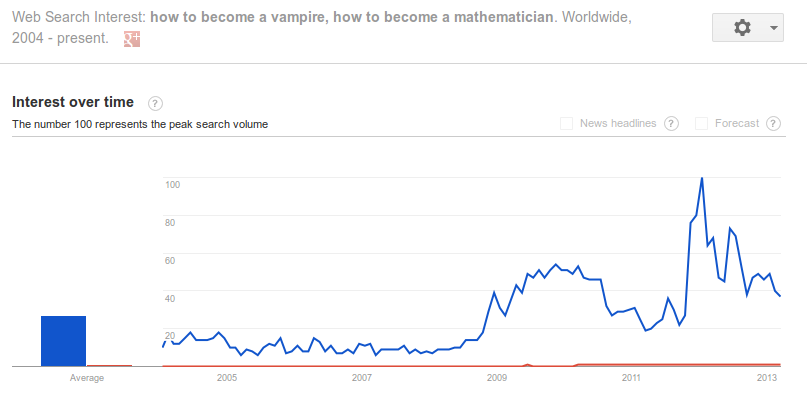Vampires versus Mathematicians
I just compared two searches on Google Trends:
- How to become a vampire is in blue.
- How to become a mathematician is in red.

Mathematics, applications of mathematics to life in general, and my life as a mathematician.
I just compared two searches on Google Trends:

swiety:
Nice compared ;D
23 March 2013, 6:23 amalvarezp:
Priceless! It really gives us a clue on the sad reality of what interests most people: what is real versus what’s not. Or am I exaggerating? Maybe it just tells us that it is easier to dream than to study.
23 March 2013, 8:38 pmmajorana:
alvarezp, it’s not a sad reality. Only very few people are mentally wired to like math, or find it exciting. For the vast majority of the population, math is difficult and boring, and no amount of persuasion will ever make math easy or interesting for them. Besides, it’s not fair to compare being a mathematician to being an immortal, almost indestructible, and exceedingly powerful uber-human.
25 March 2013, 6:05 pmKarthik:
Yes, but Ulam, Erdos, Hardy, and Ramanujan will be remembered for a long, long time. The chick who wrote Twilight? Not so much.
But I think it is also important to distinguish between the ability to be good at math versus liking math. I just love math in every form, but I am not very good at it. I chose a rather applied route – engineering and computer science. It was entirely career driven, and looking back, if I had chosen what I was passionate about, I’d perhaps be a mathematician (but probably not a very good one). I embarked down a PhD in quantum computing before I realized if I ever did a PhD, it would be in math. I did not want to waste a decade doing something that I wasn’t passionate about (albeit, enjoyable nevertheless).
I think there are more people (like me) who enjoy math than is believed, but not being great at it puts them off. Perhaps not intentionally, but rather as a resignation of their math-less careers.
29 March 2013, 1:40 amHari Parameswaran:
While it’s an interesting chart, it’s probably not a fair comparison. Let’s just consider teenagers – the few of them who want to become mathematician don’t really need to search the web on how to become one. They are already interested in the subject, and have read books, and talked to teachers on how to go about it.
On the other hand, the ones who are entranced by idiotic notions unfortunately have no other avenue of search except google (not very many books out there on the subject, nor are teachers likely to entertain such questions).
So using google as a tool for comparison is biasing it towards the latter.
Hari
8 April 2013, 2:33 amTanya Khovanova:
Hari,
I agree with you. I am glad that you noticed that.
8 April 2013, 9:32 am